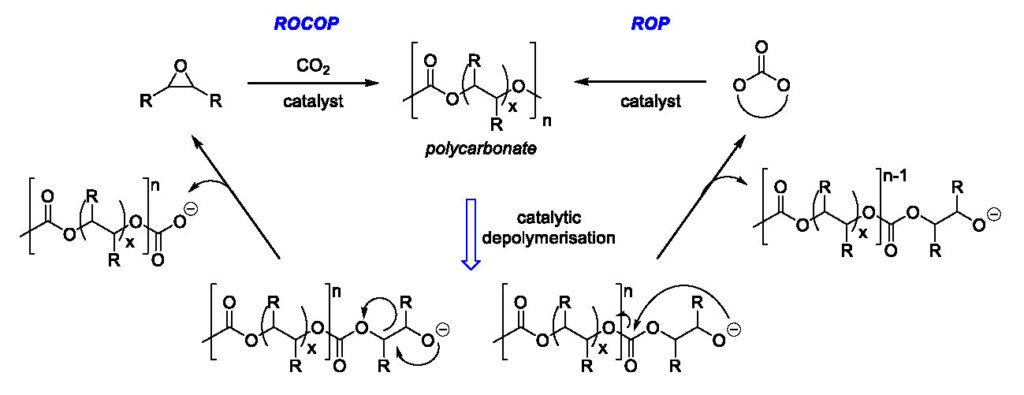Polycarbonates are a promising class of potentially sustainable polymeric materials. Polycarbonates can be synthesized by ring-opening copolymerisation (ROCOP) reactions between epoxides and CO2, a renewable C1 synthon, or alternatively by ring-opening polymerisation (ROP) of cyclic carbonates, which may in turn be prepared using CO2.1-3
Chemical recycling, in which polymers are broken down into their original monomers or monomer derivatives, is an attractive approach to dealing with the problems of plastic waste. It has been reported that depolymerisation of polycarbonates can lead to the formation of either cyclic carbonates or epoxides.4 The selectivity of the depolymerisation may be determined by the intrinsic properties of the monomers (i.e. ring strain, sterics), or may be influenced by the catalyst and reaction conditions used.5-7
A study of depolymerisation of poly(cyclohexene carbonate) (PCHC) catalysed by both bimetallic complexes and organocatalysts is presented. The choice of catalyst and reaction conditions has a marked effect on product distribution (i.e. cyclic vs. epoxide). Experimental evidence is combined with a theoretical study to gain an insight into the reaction mechanism. The recovery of either cyclic carbonate or epoxide is highly valuable, thus enabling chemical recycling of the polymer.

References:
1. S. Paul, Y. Zhu, C. Romain, R. Brooks, P. K. Saini and C. K. Williams, Chem. Commun., 2015, 51, 6459–6479.
2. P. Dubois, O. Coulembier, J-M. Raquez, Handbook of Ring-Opening Polymerization, 2009, Wiley.
3. T. M. McGuire, E. M. López-Vidal, G. L. Gregory, A. Buchard, J. CO2 Util., 2018, 27, 283–288.
4. D. J. Darensbourg, A. D. Yeung and S. H. Wei, Green Chem., 2013, 15, 1578–1583.
5. D. J. Darensbourg, S.-H. Wei, A. D. Yeung and W. C. Ellis, Macromolecules, 2013, 46, 5850–5855.
6. C. Li, R. J. Sablong, R. A. T. M. Van Benthem and C. E. Koning, ACS Macro Lett., 2017, 6, 684–688.
7. D. J. Darensbourg and S.-H. Wei, Macromolecules, 2012, 45, 5916–5922
Frances N. Singer1, Antoine Buchard1 and Charlotte K. Williams2
1. University of Bath
2. University of Oxford
Biography

Frances received an MChem from the University of York in 2015. Her final year research project looked at the synthesis of tungstoenzyme mimic complexes in the group of Dr John Slattery. She then completed a PhD at the University of Leeds under the supervision of Dr Charlotte Willans. This project encompassed both transfer hydrogenation catalysis using iridium complexes and electrochemical synthesis of NHC-complexes. She joined the Buchard group as a PDRA in June 2019, where she is working on depolymerisation reactions to allow the recycling of polymers. When not in the lab, Frances enjoys spending time outdoors, rock climbing and swimming.




